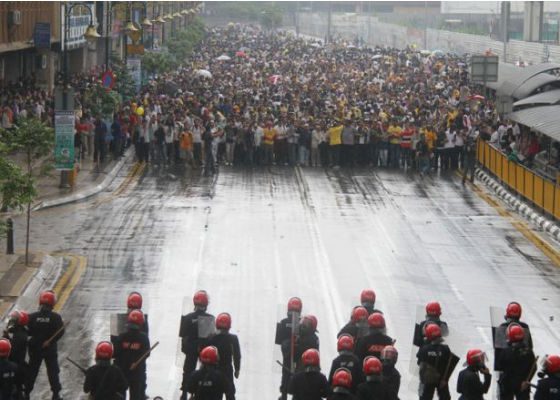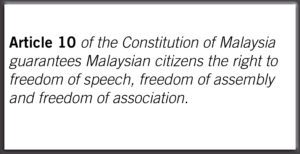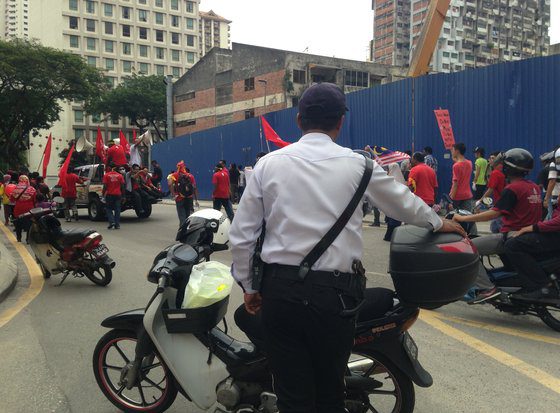

The right to assemble peacefully is a fundamental right and it is linked to other rights such as freedom of speech and freedom of religion.
At the International level such a right is provided under Article 20(1) of the Universal Declaration of Human Rights (UDHR) and Article 21 of the International Covenant on Civil and Political Rights (ICCPR).
IN MALAYSIA
In Malaysia, the right to freedom of assembly is guaranteed under Article 10 (1) (b) of the Federal Constitution which provides that :
– all citizens have the right to assemble peaceably and without arms –
- Although Article 10(1) of the Federal Constitution enshrines this freedom, Article10(2), 10(4) and Article 149 of the Federal Constitution permits Parliament to impose restrictions on the exercise of these freedom based on fourteen constitutionally permissible grounds which relate to national security and public order.
- One such law created under these headings of the Constitution is the Police Act 1967.
- The Police Act as it stands today, substantially circumvents the right to peaceful assembly.
- Permit requirement under Section 27(2) of the Police Act 1967 and its following sections are an affront to the constitutional right of the people to assemble peaceably, without arms.
RECENT DEVELOPMENT – Malaysians can assemble peacefully without fear
In April 25th, 2014, the Court of Appeal unanimously ruled it unconstitutional to criminalise spontaneous public assemblies in breach of the 10-day notice required under the Peaceful Assembly Act (PAA) 2012.
The unanimous decision of the three-man bench led by judge Justice Datuk Mohamad Arif Md Yusof upheld a fundamental right under the Federal Constitution, which is the right to assemble peacefully.
“That which is fundamentally lawful cannot be criminalised” – Justice Datuk Mohamad Arif Md Yusof –
This meant that hence forth rallies held in peace will no longer be deemed “illegal” and the public need not worry about the any action being taken against them unless they destroyed properties or committed criminal offences.
The decision made in 2014 marked the first time in the nation’s 57 years of independence that the freedom to assemble peacefully was given full effect in Malaysia.
This landmark ruling has changed the country’s human rights landscape and how NGOs can run its campaigns and AI Malaysia will use this ruling to campaign the issue in the Asia Pacific region.

HISTORICAL BACKGROUND IN THE INTERNATIONAL ARENA
In October 2010, the Human Rights Council adopted resolution 15/21 in which it:
“Reaffirm[ed] that everyone has the rights to freedom of peaceful assembly and of association and that no one may be compelled to belong to an association;
Recognizi[ed] the importance of the rights to freedom of peaceful assembly and of association to the full enjoyment of civil and political rights, and economic, social and cultural rights;
Recogniz[ed] also that the rights to freedom of peaceful assembly and of association are essential components of democracy, providing individuals with invaluable opportunities to, inter alia, express their political opinions, engage in literary and artistic pursuits; and
Recogniz[ed] further that exercising the rights to freedom of peaceful assembly and of association free of restrictions, subject only to the limitations permitted by international law, in particular international human rights law, is indispensable to the full enjoyment of these rights, particularly where individuals may espouse minority or dissenting religious or political beliefs”.
The Human Rights Council renewed its commitment to promote and protect the rights to freedom of peaceful assembly and of association, by adopting resolution 21/16 (October 2012) and resolution 24/5 (October 2013), in which it inter alia:
“Reiterat[ed] the important role of new information and communications technologies in enabling and facilitating the enjoyment of the rights to freedom of peaceful assembly and of association, and the importance for all States to promote and facilitate access to the Internet and international cooperation aimed at the development of media and information and communications facilities in all countries;
Recogniz[ed] the importance of the freedoms of peaceful assembly and of association, as well as the importance of civil society, to good governance, including through transparency and accountability, which is indispensible for building peaceful, prosperous and democratic societies;
Declared itself a]ware of the crucial importance of active involvement of civil society in processes of governance that affect the life of people;
Remind[ed] States of their obligation to respect and fully protect the rights of all individuals to assemble peacefully and associate freely, online as well as offline, including in the context of elections, and including persons espousing minority or dissenting views or beliefs, human rights defenders, trade unionists and others, including migrants, seeking to exercise or to promote these rights, and to take all necessary measures to ensure that any restrictions on the free exercise of the rights to freedom of peaceful assembly and of association are in accordance with their obligations under international human rights law;
Expresse[d] concern at violations of the rights to freedom of peaceful assembly and of association;
Emphasize[d] the critical role of the rights to freedom of peaceful assembly and of association for civil society, and recognizes that civil society facilitates the achievement of the purposes and principles of the United Nations;
Stresse[d] that respect for the rights to freedom of peaceful assembly and of association, in relation to civil society, contributes to addressing and resolving challenges and issues that are important to society, such as the environment, sustainable development, crime prevention, human trafficking, empowering women, social justice, consumer protection and the realization of all human rights; and
Call[ed] upon States to continue to cooperate fully with and assist the Special Rapporteur in the performance of his mandate, to respond promptly to his urgent appeals and other communications and to consider favourably his requests for visits”.

